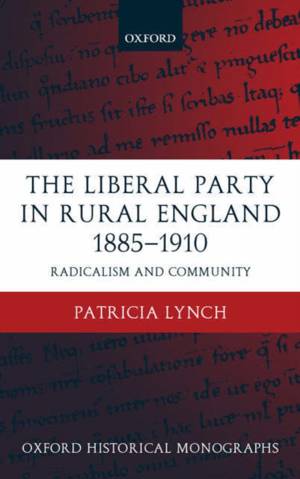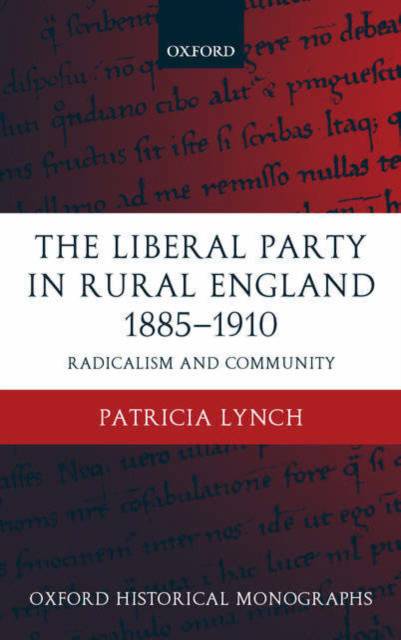
Bedankt voor het vertrouwen het afgelopen jaar! Om jou te bedanken bieden we GRATIS verzending (in België) aan op alles gedurende de hele maand januari.
- Afhalen na 1 uur in een winkel met voorraad
- Gratis thuislevering in België vanaf € 30
- Ruim aanbod met 7 miljoen producten
Bedankt voor het vertrouwen het afgelopen jaar! Om jou te bedanken bieden we GRATIS verzending (in België) aan op alles gedurende de hele maand januari.
- Afhalen na 1 uur in een winkel met voorraad
- Gratis thuislevering in België vanaf € 30
- Ruim aanbod met 7 miljoen producten
Zoeken
€ 132,45
+ 264 punten
Omschrijving
This book explores the relationship between the British Liberal party and the rural working-class voters enfranchised by the Third Reform Act of 1884. In contrast to many works that present urban voters as the primary agents of political change in nineteenth- and twentieth-century England, this study argues that an examination of the dynamics of popular rural politics is essential to a thorough understanding of political developments in the early years of mass enfranchisement. Prior to 1914, capturing a substantial portion of the rural vote was essential to any political party seeking to establish a strong Parliamentary majority; and the Liberal party, coming from a traditionally strong urban base, had to work particularly hard to meet the expectations of the new rural electorate.
The book shows that popular political culture in the English countryside was dominated by two important, and sometimes conflicting traditions: on the one hand, a history of radical social protest, emphasizing attacks on the privileges of landowning elites, and on the other, a widespread concern for the harmony of the local community, coupled with a suspicion of unnecessary divisiveness. The attempt to appeal simultaneously to both of these facets of rural political culture helps to explain not only why the Liberals continued to launch rhetorical attacks on the landed aristocracy and to promote schemes of land reform long after one might have expected them to have switched to a more 'modern' emphasis on class politics, but also why the 'New Liberal' emphasis on the politics of community carried such broad electoral appeal at the beginning of the twentieth century. The book suggests, finally, that in focusing primarily on urban democratization, historians of this period may have exaggerated the role of class allegiances in shaping popular political opinion and underestimated the continuities between 'Old' and 'New' Liberalism.
The book shows that popular political culture in the English countryside was dominated by two important, and sometimes conflicting traditions: on the one hand, a history of radical social protest, emphasizing attacks on the privileges of landowning elites, and on the other, a widespread concern for the harmony of the local community, coupled with a suspicion of unnecessary divisiveness. The attempt to appeal simultaneously to both of these facets of rural political culture helps to explain not only why the Liberals continued to launch rhetorical attacks on the landed aristocracy and to promote schemes of land reform long after one might have expected them to have switched to a more 'modern' emphasis on class politics, but also why the 'New Liberal' emphasis on the politics of community carried such broad electoral appeal at the beginning of the twentieth century. The book suggests, finally, that in focusing primarily on urban democratization, historians of this period may have exaggerated the role of class allegiances in shaping popular political opinion and underestimated the continuities between 'Old' and 'New' Liberalism.
Specificaties
Betrokkenen
- Auteur(s):
- Uitgeverij:
Inhoud
- Aantal bladzijden:
- 276
- Taal:
- Engels
- Reeks:
Eigenschappen
- Productcode (EAN):
- 9780199256211
- Verschijningsdatum:
- 27/03/2003
- Uitvoering:
- Hardcover
- Formaat:
- Genaaid
- Afmetingen:
- 148 mm x 223 mm
- Gewicht:
- 430 g

Alleen bij Standaard Boekhandel
+ 264 punten op je klantenkaart van Standaard Boekhandel
Beoordelingen
We publiceren alleen reviews die voldoen aan de voorwaarden voor reviews. Bekijk onze voorwaarden voor reviews.









